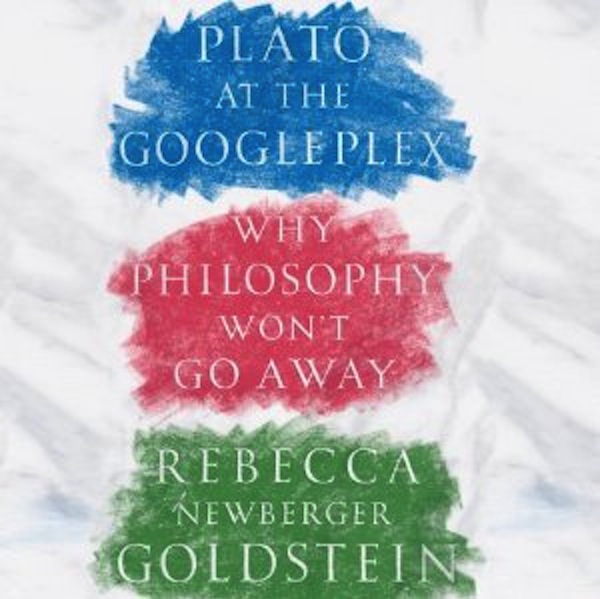Book Review: “Plato at the Googleplex” — A Passionate and Thoughtful Look at Philosophy Today
Rebecca Newberger Goldstein’s erudition, coupled to her literary skill, makes Plato at the Googleplex inviting and readable without sacrificing complexity.
Plato at the Googleplex: Why Philosophy Won’t Go Away, by Rebecca Newberger Goldstein. Pantheon, 480 pages, $29.95.
By Harvey Blume
Plato at the Googleplex is built around the idea of bringing Plato, in the flesh, from 4th century BC Athens into twenty-first century America, where he is plunged into situations calculated to challenge his way of thinking — and our own. If this results, at times, in culture clash — imagine Plato on a talk show with a right wing jock who mocks philosophy and spouts Church teachings — it might be recalled that Plato was no stranger to disputation. His dialogues dramatize debates between Socrates and his contemporaries that end only when the former is sentenced to drinking hemlock. Goldstein gives Plato a more gentle exit from America than Athens gave his teacher: when we last see him, Plato is being wheeled into an MRI machine, eager to find out what, if anything, a brain scan can add to his understanding of the mind.
Goldstein is grounded in philosophy, having written about Baruch Spinoza and Kurt Gödel, and is a practicing novelist, author, most recently, of Thirty-Six Arguments for the Existence of God. Her erudition, coupled to her literary skill, makes Plato at the Googleplex inviting and readable without sacrificing complexity. The book is also often, and here I use a term not often relevant to books of and about philosophy, moving. The author’s passion for the material shines through the text, endowing it with humor and tenderness.
Goldstein sees Plato as a kindred spirit of the great Athenian playwrights of his day, though he directed his talent away from comedy and tragedy toward “a new art form, the philosophical drama, which is what his dialogues are.” Goldstein’s reading of the dialogues runs counter to the notion that they are always harnessed to doctrine, that doctrine being what, over the course of time, has come to be called Platonism. If the Plato Goldstein brings to America had time to read books about his work — she keeps him much too busy for that — he might well have been forced to declare: I am no Platonist.
The Platonic dialog, for Goldstein, was both a new art form and an end in itself. Some conclusions are consistent over the course of Plato’s work — mathematical truth is always key connective tissue, the means of mind-meld between the self and the universe — but many vary, and often there is no conclusion at all. (Socrates did not endear himself to those whose points of view he had just rationally disproved by averring that in the end he knew nothing at all). The constant for Plato is the argument, with others and with oneself. “Greek drama,” Goldstein writes, “was, of course, brimming with violence.” She sees a sort of violence at work in the dialogues as well — “quiet violence” on philosophy’s behalf. “Philosophical thinking that doesn’t do violence to one’s settled mind is no philosophical thinking at all.”
It’s no accident that the questions Socrates poses in the dialogues — how should we live? what is a good life? on what basis do we make our choice? — have existential urgency. For Goldstein, as for others, Socrates is the great secular figure of what, following Karl Jaspers, is known as the Axial Age (roughly 800 to 200 BC) when, across a great swathe of cultures, old answers and observances ceased to suffice and reformulation and deepening were called for. Socrates, then, is in the same company as the Buddha, the Hebrew prophets, Lao Tzu, and Zoroaster. What sets him apart is his refusal to draw on religion for answers. It wasn’t that Athens lacked for piety or ritual, the gods of Olympus had not yet decamped; it was that for Socrates the gods were by definition the wrong source to appeal to for solutions to human concerns. Reason — not tradition, received opinion, or religion — was his standard.
Socrates’ stance, for Goldstein, is that of the Greek hero. He is, in a sense, the descendant of Achilles who, in the Iliad, chooses a course of action — reentering the battlefield after the death of Patroclus — that he knows will result in a short life, albeit an exemplary one, one that will be celebrated in time to come. Socrates shows Achilles-like resolve in the face of the demand from Athenian judges that he renounce his public questioning of authority. Athens had just lost the war with Sparta and could no longer tolerate someone whose entire avocation was to challenge what remained of its assumptions of superiority. (** See footnote)
But the goal of Socrates is not to follow Achilles into song but to fulfill his destiny – to practice philosophy.
Is the Socratic standard too high? Can reason bear the weight Plato and his teacher place upon it? Goldstein leaves room for doubt while making her case for living life as they conceived it. She does this by way of dialogues, twenty-first century philosophical dramas. Plato drops into dialogue wherever he goes. His first stop is at the Googleplex, headquarters of Google, Inc., where he is scheduled to give a talk on his famous dialogues. His media escort, Cheryl, is at first aghast that Plato goes by just the one name, “as if he were on a par with a Cher or a Madonna.” But then she finds herself in passionate argument with him.
Plato concedes with little contest that in abolishing slavery, America is an advance on Athens, and likewise, in according women equal rights. He wonders, though, if crowd sourcing philosophical questions about how to live, as one software engineer explains a new program, can ever come up with satisfying answers. Mostly, though, Plato engages, and with such impressive intensity that he can barely be pried away to give his talk. It is not lost on Cheryl that Plato devotes every bit as much attention to her opinions as to the software big shots who’ve actually read him, and want him all for themselves. Cheryl can see that conversation was “his life’s blood.”
At the Googleplex, Plato picks up on the Internet quickly and soon becomes inseparable from his laptop. When he Googles for the first time, the word he enters is — you guessed it — “Socrates” — which gets 4,700,000 hits, including images. Plato goes silent at that point, and a look comes over him that even ever chatty Cheryl can’t begin to describe.
**
Here it’s worth stopping to credit Goldstein with at least taking up the interpretation of the death of Socrates put forward by I. F. Stone in The Trial of Socrates (1988), a book most classicists simply ignore.
Stone was an American gadfly, a leading critic, through I.F. Stone’s Weekly, of the War in Vietnam. In his later years, he taught himself Greek to look into the Athenian origins of the democratic idea, and came to the conclusion that Socrates was sentenced to death because he had committed treason against Athens, siding with Sparta, whose hierarchical system was more to his taste, during the Peloponnesian war.
Goldstein rejects Stone’s claim. She writes: “Perhaps it is no surprise that Stone, whose lifelong orientation was political, would interpret Socrates’ death in exclusively political terms.” Goldstein’s Socrates is not nearly as political as Stone makes him out to be. His focus was always on the personal. Socrates was sentenced to death, in her view, because
after the wounds inflicted by Sparta, Athens could no longer allow a “genuine sAthenian eccentric” to go around challenging what was left of its everyday assumptions.
This is likely the case. Nevertheless, Goldstein fudges the question of how to distinguish ethics from politics. Stone may have been wrong about Socrates. Was he wrong, therefore, in thinking ethics demanded investigating and opposing the politics behind the War in Vietnam?
What if Goldstein brought Plato back, not to the Googleplex but to the anti-war movement, circa 1968? What would Plato have said to Mario Savio, a few years earlier, or to Mark Rudd or Malcolm X, about hard and fast distinctions between the personal and the political? That, of course, would be another book. The one we have is instructive. Plato should come back again.
Harvey Blume is an author — Ota Benga: The Pygmy At The Zoo — who has published essays, reviews, and interviews widely, in The New York Times, Boston Globe, Agni, The American Prospect, and The Forward, among other venues. His blog in progress, which will archive that material and be a platform for new, is here. He contributes regularly to The Arts Fuse and wants to help it continue to grow into a critical voice to be reckoned with.
Tagged: Plato at the Googleplex: Why Philosophy Won't Go Away



Thanks again Harvey, I’m recovering from a cold right now in Heraklion Greece having left Athens two days ago. I just read your latest review and plan to download Ms Golldstein’s work on Plato as soon as possible. I can attest that Greece is alive and, like us all, in need of good decisions. Is Platonic reasoning able to guide us today. I look forward to hearing what he has to say.
Jeff
Hi. Rest up. Enjoy Greece. My regards to the Parthenon. (What? You didn’t go there!?)
While I’m at it, I think I’ll use this as an opportunity to say something I wanted to that didn’t seem to fit into the review.
Plato at the Googleplex has occasioned controversy.
In the course of a mostly appreciative take on Plato at the Googleplex for the NY Times Book Review (4/20/14), Anthony Gottlieb, an Oxford Fellow, wrote that the book was, in effect, “a love letter to Plato.”
The Times then published two irate letters in response, one by Susan Jacoby, a notable writer about and proponent of secularism/freethinking, [https://artsfuse.org/77019/short-fuse-interview-susan-jacoby-robert-ingersoll-and-keeping-the-secular-tradition-of-american-history-alive], who thought it terribly patronizing for the reviewer to describe Goldstein’s book that way.
Jacoby asked: “Whether, if Plato himself were the author being reviewed, his dialogues would be described as love letters to Socrates.”
Let me take her up, starting with the second point.
If Plato were publishing today — or, assuming reviewers had a way to respond back then — it would be perfectly correct to describe Plato’s dialogues as love letters to Socrates.
As for the first charge, yes, Goldstein’s book is a love letter to Plato. A great one.
Let me quote what Paul McCartney said in response to John Lennon, when Lennon faulted him for writing love songs:
What’s wrong with that?
I want to know.
My review of Plato at the Googleplex is a love letter to it.
I loved the book.
It’s admirable, I suppose, for Jacoby to step up in defense of what she takes to be an insult to her “friend Rebecca Goldstein.”
But maybe, since Jacoby says that she “always found Plato tedious” it might have been better for her to have just simply corked it, until she read up.